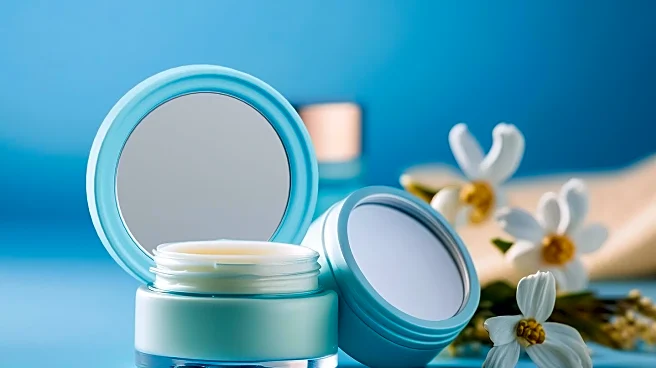What's Happening?
The skincare trend known as 'slugging' has gained significant attention on TikTok, with over 500 million views under the hashtag #slugging. This Korean beauty practice involves applying petroleum jelly, such as Vaseline, Aquaphor, or CeraVe, to the face
to lock in moisture overnight. Dermatologists have weighed in on the trend, noting its effectiveness in moisturizing and repairing the skin's outer layer. The process typically involves applying humectants like hyaluronic acid or glycerin before the petroleum jelly to maximize benefits. While slugging is praised for its ability to provide plump, glowing skin, experts caution against its use for acne-prone individuals, as it may trap oils and clog pores.
Why It's Important?
Slugging represents a shift towards accessible and cost-effective skincare solutions, particularly beneficial during colder months when skin tends to dry out. The trend underscores the influence of social media in popularizing beauty practices and the importance of expert guidance in adapting these trends safely. For individuals with dry skin, slugging offers a practical method to enhance skin hydration and barrier repair, potentially reducing the need for expensive skincare products. However, the trend also highlights the need for personalized skincare approaches, as its benefits may not extend to those with oily or acne-prone skin.
What's Next?
As slugging continues to gain popularity, dermatologists may further investigate its long-term effects and potential adaptations for different skin types. The trend could inspire new product formulations that combine humectants, emollients, and occlusives in a single application. Additionally, skincare brands might capitalize on the trend by marketing products specifically designed for slugging, potentially expanding their consumer base. The ongoing dialogue between dermatologists and consumers on social media platforms will likely shape the evolution of slugging and similar skincare practices.
Beyond the Headlines
Slugging's rise highlights the cultural exchange between Korean beauty practices and Western skincare routines, reflecting broader globalization trends in the beauty industry. The trend also raises ethical considerations regarding the environmental impact of petroleum-based products and the importance of sustainable skincare solutions. As consumers become more informed, there may be increased demand for eco-friendly alternatives that offer similar benefits without compromising environmental integrity.
















